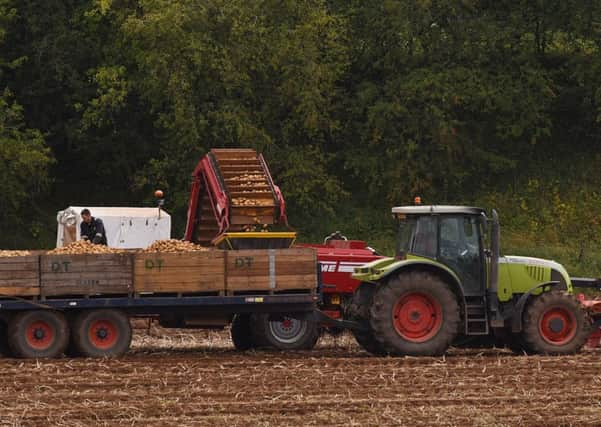Farming faces tough job to seal export deals post-Brexit
This article contains affiliate links. We may earn a small commission on items purchased through this article, but that does not affect our editorial judgement.


Peter Hardwick, head of exports at the Agricultural & Horticulture Development Board (AHDB), said that securing the future of vital exports such as seed potatoes and malting barley was likely to be a complex and challenging task – but would be crucial for the industry.
“Taking the seed potato sector as an example, the industry sees some real challenges,” he said.
Advertisement
Hide AdAdvertisement
Hide Ad“We need to be realistic – 75 per cent of our seed potato exports now go outside the EU and we need to ensure there’s continuity in those markets.”
• READ MORE: Farming news
Hardwick said that, as the UK was listed separately in the agreement, it might at first appear that it would be a straightforward job to disentangle the UK from the wider agreement and then enter a bilateral deal with non-EU countries.
However, Hardwick he that it only took “a bit of digging” into the detail of these agreements to discover that that the underlying commitment which had actually been signed up to was one which was governed by European treaties which the UK was set to leave.
“For example, within the agreement with Egypt, there’s a specific commitment that the EU supplies seed potatoes tariff and quota free, but there is a reciprocal agreement that we take 250,000 tariff-free tonnes of ware potatoes from Egypt.
“It’s quite clear the UK will not want to take that full quota, so we will have to enter into some form of negotiation.”
Hardwick added that even the UK’s bilateral agreements – such as that for exporting malting barley to China – would be affected by Brexit.
However, the organisation’s knowledge exchange manager, Phil Dolbear, said that although farmers should be aware of these problems, they should concentrate on issues which they could control themselves.
Advertisement
Hide AdAdvertisement
Hide Ad“Although farmers are acutely aware of the markets at a global level, they are becoming more aware of what they can control at an on-farm level,” said Dolebear, who added that a greater degree of trust and co-operation was developing between producers.
• The UK potato acreage looks set to be up 4 per cent on the year, according to the latest estimates.
With plantings in Great Britain standing at just over 121,000 hectares, the figure is close to that in the ground in 2014 and similar to those of 2012 and 2013.
The statistics, drawn together by AHDB potatoes market intelligence analysts, show a similar increase has taken place across much of Europe, where a 3.6 per cent increase is expected in the main potato growing areas of Belgium, the Netherlands, Germany and France.
However, AHDB analyst Amber Cottingham said that everything was yet to play for as far as overall production.
Despite the area increase, final production figures would depend on the yield of potatoes per hectare – but Cottingham said that various scenarios did point to higher production.
“There is still a lot of growing time remaining in the season, so nothing can be taken for granted at this stage,” she said.
Advertisement
Hide AdAdvertisement
Hide Ad“An increase in production of between 4 per cent and 8 per cent might sound sensible, but if this season sees another record high-yielding year such as 2015 then production could be as high as 5.9 million tonnes.”
• READ MORE: Scottish potato exporters eyeing new market in Kenya
A good growing season could see production up by as much as 13 per cent up on the year, she said – but if weather events changed dramatically and yields took a nosedive then production could fall overall.
“A five-year average yield of 44.7 tonnes per hectare (t/ha) would see a production increase of 4 per cent. This average includes 2012, which was an extremely low yielding year due to adverse weather. If we exclude 2012 from the average it becomes 46.7t/ha, harvest at that rate would result in an 8 per cent increase in potatoes on the market compared to the 2016-17 season.”
She added that an area update would be issued in August.